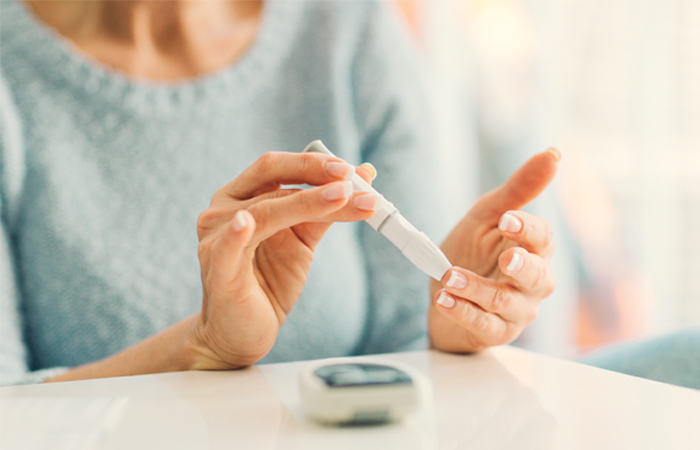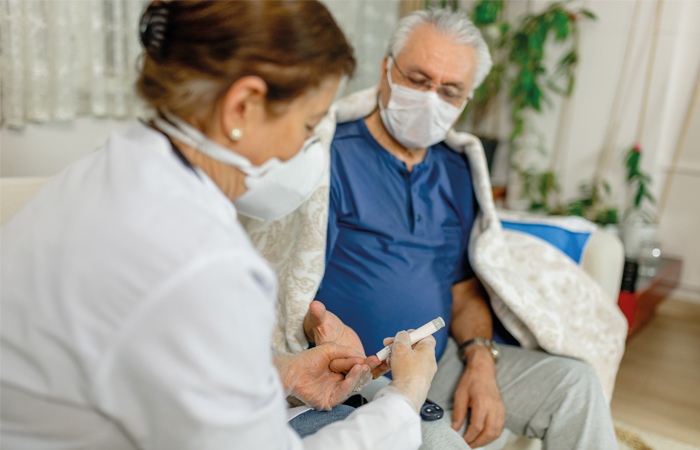Dealing with diabetes
In Population Health
Follow this topic
Bookmark
Record learning outcomes
People with long-term conditions are at increased risk of the complications of Covid-19 infection, but may also have other concerns about their health. So what are the considerations for those with diabetes?
Infections are more commonly experienced by people with diabetes than those without the condition, and there is also a higher risk of these infections becoming complicated. As such, this patient group has been identified as being at increased risk of severe illness from Covid-19. While most individuals are not in the “extremely vulnerable” group who have been advised by the Government to practice “shielding” (see panel), they should be particularly careful in following social distancing measures and keeping safe.

This means staying at home except for exercise; medical or care needs; travelling to and from work, if this is essential and can’t be done from home; and buying basic necessities such as food and medication, although these trips should be as infrequent as possible. When out and about, it is important to stay a minimum of two metres apart from other people and to wash hands with soap and water for at least 20 seconds upon returning home.
The symptoms of the Covid-19 infection are no different for those with diabetes, with the most common being a fever and/or a new continuous cough, which is defined as coughing a lot for more than an hour, three or more coughing bouts in 24 hours, or a worse than usual cough for individuals who usually have a cough anyway. Anyone with these symptoms should stay at home for seven days from when the symptoms started, and use the dedicated NHS 111 online service instead of visiting a GP surgery, pharmacy or hospital if they become concerned about their symptoms. The NHS 111 telephone service is available for those who cannot access the help they need online, or for those who might be worried, for example about a child or baby with symptoms.
There is, of course, still urgent medical help available for those who are very unwell or deteriorating. A recent rise in the number of non-Covid-19 related deaths might be explained by people avoiding hospitals, but the chief executive of NHS England, Sir Simon Stevens, has stated that there is capacity and is urging people to seek help if they need it.
Vulnerable individuals
Some specific patient groups have been highlighted as being at very high risk of severe illness from Covid-19 due an underlying health condition, so have been advised to adopt “shielding” measures to minimise interactions with others.

The groups include:
• Solid organ transplant recipients
• Certain cancer patients, including those currently undergoing active chemotherapy or having targeted treatments that affect the immune system, and anyone with cancers of the blood or bone marrow, such as leukaemia or lymphoma, at any stage of treatment
• Anyone with a severe respiratory condition, such as cystic fibrosis or brittle asthma
• People with rare diseases that significantly increase the risk of infections, such as severe sickle cell disease
• Those on immunosuppression therapies at a high enough level that the risk of infection
is significantly increased
• Pregnant women who also have significant heart disease.
The above individuals should have received a letter from the NHS strongly advising them to stay at home at all times for at least 12 weeks in order to avoid face-to-face contact, other than with household members and anyone who delivers essential support or care – although these individuals should stringently adhere to guidance on social distancing. Most people with diabetes will not need to shield.
There is more information on the Government's website about shielding.
Advice and complications
Specific advice for patients with diabetes on managing their condition during the Covid-19 pandemic if they become unwell includes the following:
- Stay hydrated as dehydration is particularly dangerous in diabetes
- Follow medical advice on managing medication when unwell
- Those who regularly check blood glucose levels at home should continue to do so, and may need to monitor more closely than usual, for example people with type 1 diabetes are advised to check every four hours, including at night, and test for ketones
- Hyperglycaemia can be an issue when unwell. Signs include passing more urine than normal, extreme thirst, headaches, tiredness and a lack of energy. Help should be sought if needed
- Hypoglycaemia can also occur, particularly if the individual is struggling to eat. Signs include altered mood and behaviour, palpitations, sweating, weakness, tiredness, impaired vision and confusion. If left unchecked it can lead to convulsions, loss of consciousness and coma. Having a ready supply of carbohydrate, for example glucose sweets, can lift someone out of a hypo so they are then able to eat something that has a slower release source of energy
- Patients on SGLT2 inhibitors, which have the suffix -gliflozin (e.g. empagliflozin) should stop taking them if they become unwell due to the risk of the serious condition diabetic ketoacidosis (DKA). Signs of DKA are similar to hyperglycaemia, but can also include abdominal pain, nausea, vomiting, confusion, blurred vision and breath that smells like nail varnish or pear drop sweets.
People with diabetes and Covid-19 are more likely to develop a severe illness and may also struggle to manage their blood glucose levels. This is because one of the ways the body tries to deal with an infection is by releasing stored sugars in order to give an energy boost. Someone with diabetes does not have the ability to produce the insulin needed to cope with this and so may experience hyperglycaemia.
As well as being dangerous in the short term, Covid-19 infection may increase the risk of the well-known complications of diabetes that can occur in the long term, such as problems with the eyes, feet and kidneys.
Getting hold of supplies
Patients with diabetes may be concerned about running out of their medication, but Diabetes UK states that there is no need for stockpiling to be done by the public or the NHS, as this could cause shortages and put other patients at risk. Diabetes UK has explained that “the Government has been working with industry and partners to monitor the impact of coronavirus on the UK supply chain of medicines and technology and put in place measures to protect UK patients. This includes banning companies from buying medicines like insulin that are meant for UK patients and selling on for a higher price in another country. This will help ensure an uninterrupted supply of crucial medicines like insulin for NHS hospitals treating coronavirus patients.”
Diabetes UK is particularly supportive of pharmacy teams, telling patients: “Pharmacies are working hard to make sure that everyone with diabetes gets the medicines they need. Help them to help you.” The charity is also passing on the following tips to people with diabetes with the aim of easing pressure on community pharmacies, and pharmacy teams can also suggest these to patients:
- Plan ahead with a view to ordering prescriptions at least 14 days before they are due
- Ask prescribers about electronic repeat dispensing schemes to facilitate online ordering
- Do not ask for, or stockpile, extra medicines
- Put contact details on prescriptions so pharmacy staff can get in touch directly when medication is ready to collect in order to avoid overcrowding in stores
- Do not phone pharmacies unless it is urgent
- When self-isolating, ask friends and family to collect medication from pharmacies, or get in touch with local community or voluntary groups to see if they can help
- When prescriptions are being collected on behalf of someone else, the person collecting should carry the patient’s identification and make sure they know the name and address of the patient in order to speed up the process.
Staying well
It might feel a bit of a challenge for people with diabetes to stay well while confined to home, but it is not only possible, it is essential. In terms of diet, it is best to have a structure for meals, making sure they happen at set times and places in order to reduce the chance of snacking and sitting in front of a screen while eating. Shopping might be tricky, but if usual items are out of stock, viewing this as an opportunity to try some new things is a great way of reframing a potentially difficult situation. Examples include trying brown rice or bulgur wheat if white rice is unavailable, and using wraps instead of bread.
When it comes to exercise, there are plenty of activities that are well suited to the home environment. Online gym, yoga and dance classes where no equipment is needed, attacking household chores such as vacuuming, gardening and DIY projects with vim and vigour, or walking up and down the stairs a few times are all good options.
For those with less energy, standing up and stretching or marching on the spot during advert breaks or between programmes when watching TV, for example, are simple ways to get moving. The benefits go beyond increasing heart rate: the positive impact of physical activity on mental health is well documented, and there are few better reasons to look after personal wellbeing than the unusual state of suspended animation everyone is living in right now.
Know your types
With diabetes, the focus is usually on the type 2 form of the condition. It is easy to see why: not only does type 2 affect around 90 per cent of people with diabetes, but there are also things that can be done to reduce the risk of developing the condition. These include eating healthily, maintaining a healthy weight, and being physically active.
This does not mean that type 1 diabetes is any less important, however. In fact, it can be a lot more severe when it presents because the symptoms usually appear very quickly; this is due to them stemming from the body attacking the pancreas and stopping it making the insulin that is needed, which is a different disease process to that of type 2 diabetes. The risk factors are also different, with type 1 unaffected by lifestyle or weight and being much more common in childhood and younger people. Management also differs, with insulin, rather than lifestyle, being the mainstay of treatment for type 1 diabetes.
Nonetheless, the two types do have a lot in common: presenting symptoms are the same, such as going to the toilet much more than normal and particularly at night, thirst, tiredness, getting minor infections such as colds and thrush more often and finding that cuts and wounds take longer to heal. Lifestyle advice is also similar, with a healthy, balanced diet and regular physical activity core components of management. The latter was the subject of a recent 10-minute podcast by NICE, which explains that people with diabetes should not avoid exercise altogether, despite their condition, as the benefits far outweigh any concerns.
Pharmacy teams can help people with diabetes understand their condition better and may want to participate in national campaigns such as the upcoming Diabetes Week.
